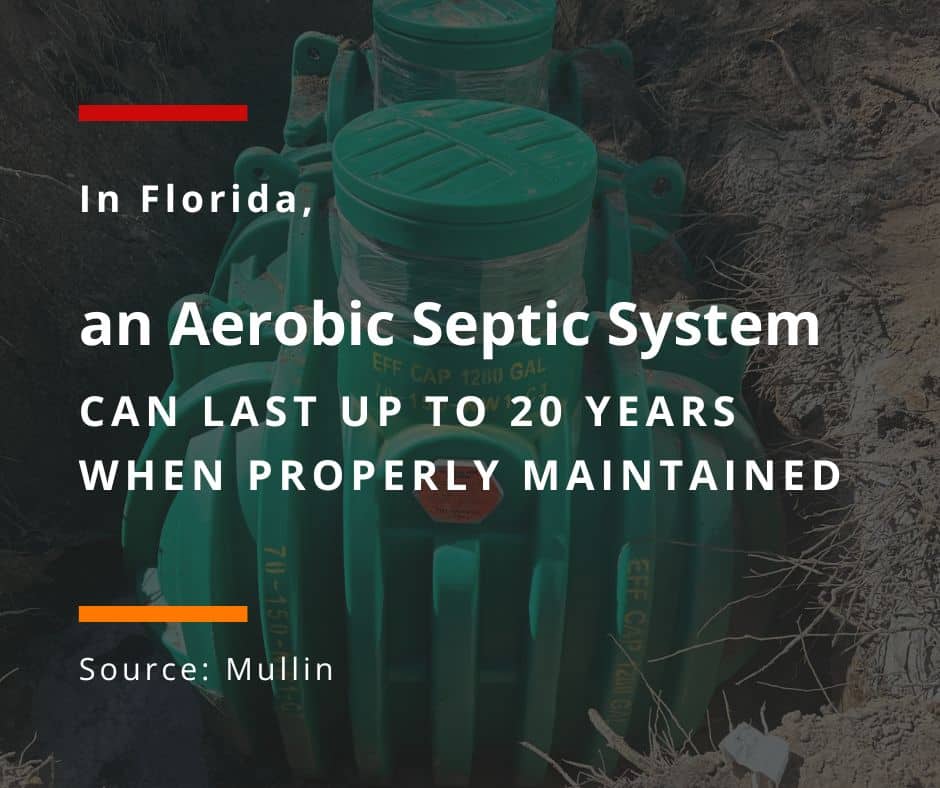A well-maintained aerobic septic system can last for decades, but without proper care, it can break down long before its time, leading to costly repairs and health risks. Unlike traditional septic systems, aerobic systems rely on oxygen to break down waste more efficiently. However, they also require regular maintenance and careful use to function right
Especially in Florida’s humid climate (where excess moisture and soil conditions can have an impact), taking a few simple preventative steps can keep your system working smoothly and extend its lifespan.
1. Mindful Water Use
Your aerobic septic system treats wastewater efficiently, but too much water at once can overwhelm it.
When that happens, the system can’t fully treat waste before releasing it, increasing the risk of clogs, backups, and drain field failure. Here’s how to prevent overloading:
- Space out laundry and dishwashing – Running multiple loads back-to-back dumps too much water into the system at once.
- Fix leaks immediately – A running toilet or dripping faucet might not seem like much, but over time, it can overload your system.
- Limit long showers and heavy water use at once – Give your system time to process wastewater before adding more.
- Redirect rain gutters and yard drainage – Excess water near your septic system can flood the drain field, preventing proper filtration.
- Use water-efficient appliances and fixtures – Low-flow toilets and showerheads reduce water usage and ease the strain on your system.
2. Stick to a Regular Maintenance Schedule
Aerobic septic systems require routine maintenance to keep everything working correctly. Without it, solids can build up, aerators can fail, and wastewater may not be treated properly—leading to expensive repairs and environmental hazards.
At a minimum, professional maintenance should include:
- Checking the aerator – This ensures oxygen is properly circulating in the system, which is essential for breaking down waste.
- Monitoring chlorine tablet levels – Many aerobic systems use chlorine to disinfect treated wastewater before it’s released.
- Inspecting spray heads or drip irrigation components – If your system disperses water through spray irrigation, clogged heads can prevent proper drainage.
- Testing the alarm system and control panel – Alarms alert you when something is wrong, so keeping them functional is key.
Most aerobic septic systems need a professional inspection every six months to a year, depending on usage and manufacturer recommendations.
Skipping maintenance increases the risk of system failure, odors, and untreated wastewater backing up into your yard or home.
3. Keep Chemicals and Nonbiodegradable Waste Out
Aerobic septic systems rely on beneficial bacteria to break down waste. Harsh chemicals and non-biodegradable items can kill those bacteria or clog system components, leading to system failure.
What should never go into your system?
- Harsh cleaners, bleach, and antibacterial soaps – These disrupt the bacterial balance needed for waste breakdown. Stick to septic-safe products.
- Fats, oils, and grease – They solidify in pipes and tanks, causing blockages and system failure.
- Paints, solvents, and household chemicals – These can corrode system parts and interfere with wastewater treatment.
- Paper towels, wipes, feminine products, and coffee grounds – Even “flushable” wipes don’t break down properly and can clog components.
4. Protect the Drain Field from Damage
The drain field is where treated wastewater is dispersed into the ground. If it gets compacted, blocked, or oversaturated, your system may stop working properly—leading to backups, standing water, and bad odors.
Here’s how to protect it:
- Keep heavy equipment and vehicles off the area – Driving over the drain field can compact the soil, making it harder for wastewater to filter properly.
- Avoid planting trees or shrubs nearby – Roots can invade pipes and block wastewater flow. Stick to grass or other shallow-rooted plants.
- Redirect rainwater and excess irrigation away – Too much water can flood the drain field, preventing proper absorption.
- Watch for warning signs – If you notice slow drainage, standing water, or strong odors near your drain field, your system may be struggling.
Other Maintenance
- Clean the air pump filter regularly to ensure proper oxygen flow.
- Check spray irrigation heads for blockages (if your system uses them).
- Test your alarm system to make sure it alerts you to any malfunctions.
- Monitor for unusual smells, slow drains, or pooling water—these could indicate a problem.
When to Call a Professional
Even with proper maintenance, septic issues can still happen. Some problems aren’t obvious right away, and delaying repairs can lead to more extensive damage.
If you notice any of the following, it’s time to call a professional:
- Alarms going off or aerator failure – Your system may not be treating waste properly.
- Slow drains, backups, or gurgling pipes – Signals of a clog, improper treatment, or an issue with the drain field.
- Strong odors inside or outside – Persistent odors may indicate a breakdown in treatment.
- Pooling water near the drain field or septic tank – Can signal a system overload, drain field failure, or a serious blockage.
- Lush, fast-growing grass over the drain field – While some grass growth is normal, an unusually green or soggy patch could mean wastewater isn’t filtering properly.
- Clogged spray heads or reduced pressure in irrigation systems – If your aerobic system uses spray irrigation, blockages or malfunctioning components can cause uneven dispersal.
Conclusion
Taking a few simple steps can make a big difference in extending the life of your aerobic septic system. Mindful water use, routine maintenance, keeping harmful substances out, and protecting your drain field all help your system run efficiently while preventing costly repairs.
If your system needs inspection, maintenance, or repairs in the Tampa area, Tampa Bay Septic’s experienced team is here to help with in-depth inspections, maintenance, pumping, and repairs to keep your system functioning properly.


